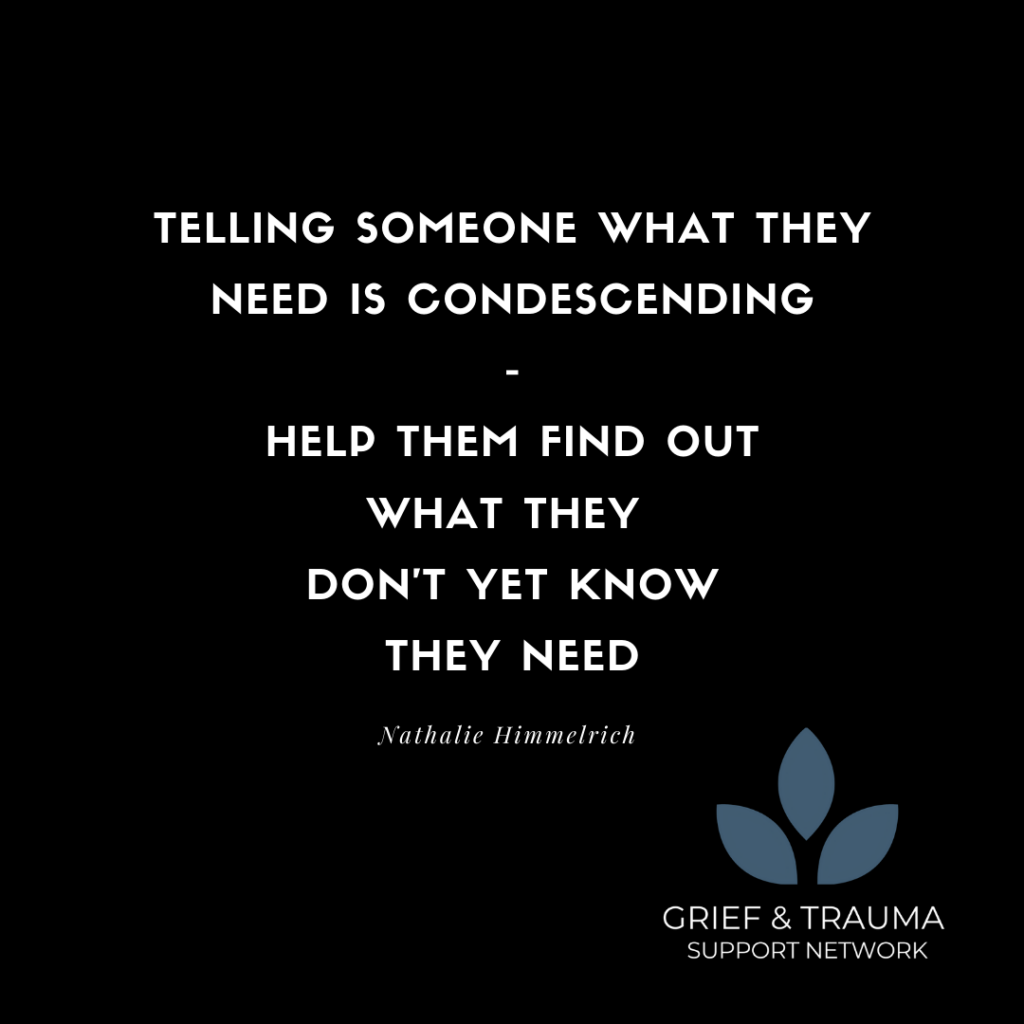“The answers you get depend on the questions you ask.”
― Thomas S. Kuhn, Author of the book The Structure of Scientific Revolutions

Supporting yourself or someone else through the throws of grief and trauma really depends on the conversations that are happening, inside and outside. It is about the thoughts we have in our minds and the questions we ask those we are supporting.
In order to understand the power of questions in grief support, let’s look at the most important three different types, adapted to the situation of grief, loss, trauma, and the support with those situations.*
Table of Contents
Closed questions
Closed questions often invite a one-word answer, such as ‘yes’ or ‘no’. For example, ‘did she die immediately?’ or, ‘did you feel numb?’ They could also include answers to factual or multiple-choice questions, such as ‘how old was he when he died’, or ‘does it hurt more in the morning or in the evening?’
These questions are easy to answer and don’t require much detail. They, however, don’t really invite the person asked to open up about how they feeling or to share what they would need to talk about.
Useful for: getting a quick answer, not overwhelming the other person
Be mindful that: these questions do not open up for a deep conversation
Open questions
Open-ended questions can’t be answered with a simple yes or no response. They require a little more thought and readiness from the questioner to the potential of emotionality this might bring up in the person asked. These kinds of questions however also encourage wider discussion and elaboration. For example: ‘what do you think of the doctor’s advice?’ Or ‘why did you choose that kind of treatment?’ Or ‘what does it bring up for you to be without your mother on Mother’s Day?
Useful for: critical or creative discussion, finding out more information about a person or subject
Be mindful that: open questions can elicit emotions but also really allow the person to share from their heart, which is important
Probing questions
These questions are useful for gaining clarification and encouraging others to tell you more information about a subject. Probing questions are usually a series of questions that dig deeper and provide a fuller picture. For example: ‘when would you like me to come over, or would you like to give me a call when you are ready?’
Useful for: seeing the bigger picture, encouraging a reluctant speaker to tell you more information, and avoiding misunderstandings
Be mindful that: they need to be asked with sensitivity as the griever or traumatized might easily feel criticized or attacked for their way of dealing with their situation
A word on tone
Did you know that we take more than half of the meaning of a conversation out of body language? In addition, tone, context, and intonation, all help us make sense of what is being asked of us. But what happens when you throw technology into the mix and place a digital screen between the interlocutors? All those over 50% of the message carried by body language, tone, and intonation gets lost in translation.
Emojis and gifs have made their way into conversations everywhere. They can be useful but also lead to misunderstandings. Generally, I would always, if possible, prefer talking face-to-face with someone in distress over the phone or by text.
With a certain level of carefulness towards tone and a knowledge of how to ask questions in the right way, you can get a lot more out of your conversation.
Best supporting questions for the bereaved or traumatized
Choosing the best and most supportive questions to ask really depend on the circumstances and on the relationship between the people in conversation.
Here are some of those that I have found work really well to get a conversation going:
- How are you doing today?
- Based on what you know and what works best for you, what would help you the most? (you might like to follow up with 3-5 suggestions, if the person doesn’t come up with an answer themselves)
- What has supported or helped you cope in the last few hours/days/weeks/months?
When working with people I found that when I have established a deeply trusting and supportive relationship with the client I can ask almost any question. This naturally is based on my lengthy experience and my sensitivity to the topic of grief, loss, and trauma.
👉🏼 Griever Input
Letting the people surrounding you know what is helpful and what is not is your right. They don’t know better, what you need, than YOU.
👉🏼 Supporter Input
Experience has shown that grieving or traumatized people appreciate being asked with sincerity and the intent of support. They do tell you when they don’t want to talk about certain things. They generally react well to being asked what they need, rather than being told.
*The types of questions are from the article ‘The 8 essential questioning techniques you need to know’ adapted to grief, loss, trauma.

Family and kids helped and my daughter’s friends but not my husband but everyone goes back to normal and I’m stuck 5yrs almost took this long to get a therapist to help and losing weight helped me just have to keep going hope this helps someone from Ashley’s mumxxx
Dear Lesley,
Thank you for your comment.
It’s true – people go back to normal… That is what the book Bridging the Grief Gap intends to shed light on: the support needed by the bereaved and the time they require support.
Sending you my love – holding Ashley’s memory in my heart ♥️
Much Love ♥️ Nathalie